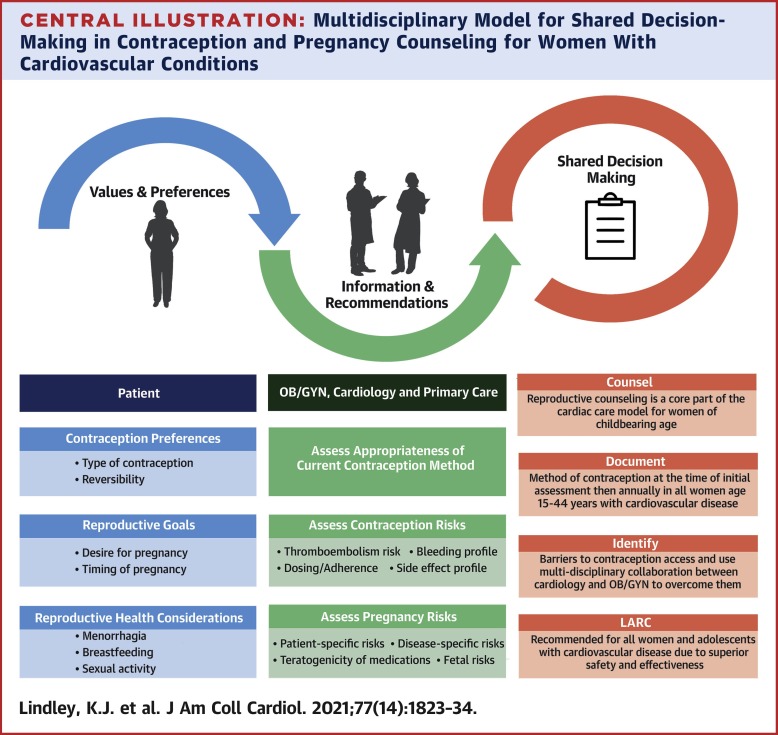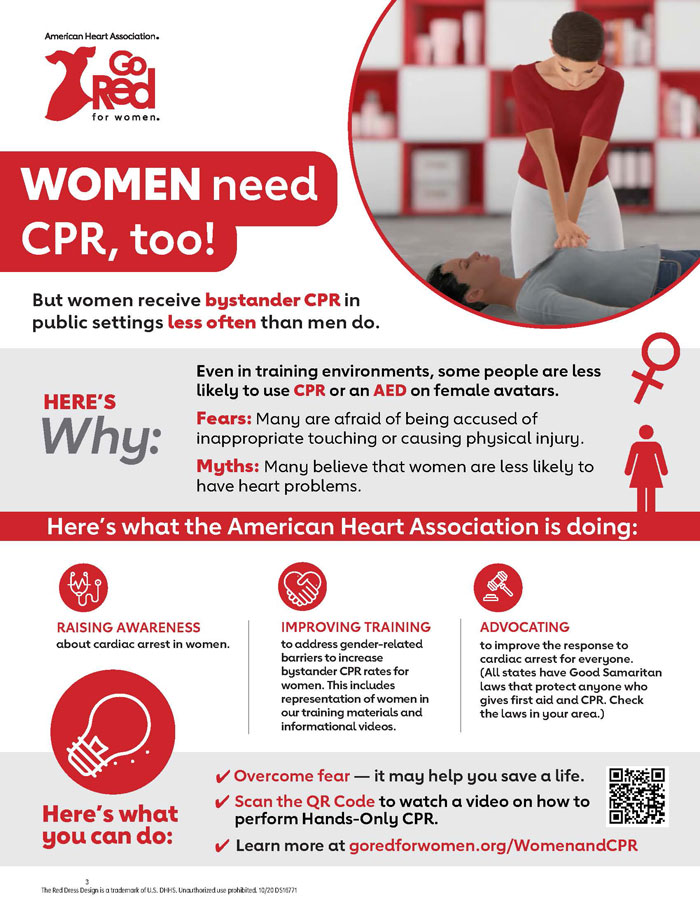Physical Address
304 North Cardinal St.
Dorchester Center, MA 02124

Women are at risk of heart disease just like men. In fact, heart disease is the leading cause of death among women worldwide.
It is important for women to be aware of the risk factors, symptoms, and preventive measures associated with heart disease to protect their heart health and overall well-being. This article provides an overview of women and heart disease, highlighting the prevalence, risk factors, and steps women can take to reduce their risk of developing this potentially life-threatening condition.
By understanding the significance of heart disease in women, individuals can make informed decisions to prioritize their cardiovascular health and lead a heart-healthy lifestyle.

Credit: www.ahajournals.org
Heart disease is a prevalent concern among women, underscoring the importance of understanding its risks and prevention strategies. By being proactive in recognizing symptoms and adopting healthy lifestyle choices, women can reduce their likelihood of developing heart disease.
Heart disease has long been considered a health concern primarily affecting men. However, the prevalence of heart disease in women is on the rise, highlighting a significant gender gap. Women are often unaware that they are at risk, as the symptoms of heart disease may be different from those experienced by men. Understanding this gender gap is crucial to ensuring that women receive timely diagnosis and appropriate treatment.
Unlike men, women may not experience the classic symptoms of heart disease, such as severe chest pain. Instead, they may have subtler symptoms, which are often mistaken for other conditions or dismissed as mere indigestion or stress. Common symptoms in women include:
These symptoms may come and go, making it even more challenging to recognize them as potential signs of heart disease. It is essential for women to be aware of these atypical symptoms and consult with their healthcare provider if they experience any concerning changes in their health.
Early intervention is critical in reducing the risk of heart disease complications in women. Regular check-ups and heart health screenings can help identify potential risk factors and allow for timely intervention. Additionally, making lifestyle modifications such as adopting a heart-healthy diet, engaging in regular physical activity, maintaining a healthy weight, and managing stress levels can significantly reduce the risk of heart disease in women.

Credit: www.goredforwomen.org
Heart disease is a serious health condition that affects both men and women. However, it is crucial to recognize that women may experience different risk factors compared to men. Understanding these risk factors can help women make informed choices for a healthier lifestyle and reduce their chances of developing heart disease. This article will explore the various risk factors specific to women, including lifestyle choices and hormonal factors.
Adopting a healthy lifestyle is one of the most effective ways for women to reduce their risk of heart disease. Here are some lifestyle choices that can have a significant impact:
The hormonal fluctuations that women experience throughout their lives can influence the risk of heart disease. It is important to consider the following hormonal factors:
By understanding and addressing these risk factors, women can take proactive steps towards maintaining a healthy heart. Implementing positive lifestyle changes and staying informed about hormonal factors can significantly reduce the possibility of developing heart disease. Remember, small changes today can lead to a healthier tomorrow.
Heart disease is a major health concern for women, with statistics showing that it is the leading cause of death in women worldwide. However, the good news is that heart disease can be prevented by adopting healthy habits and gaining the right knowledge about cardiovascular health. By empowering women with the tools and information they need, we can make a significant impact in reducing the incidence of heart disease among women.
One of the most effective ways to prevent heart disease in women is by promoting healthy lifestyle habits. Encouraging women to incorporate regular exercise, nutritious eating, and stress management techniques into their daily routines can significantly reduce their risk of developing heart disease. Physical activity such as brisk walking, jogging, or swimming for at least 30 minutes a day can help strengthen the heart and improve overall cardiovascular health.
Eating a balanced diet that is rich in fruits, vegetables, whole grains, and lean proteins can also play a crucial role in preventing heart disease. By limiting the consumption of saturated and trans fats, sodium, and added sugars, women can maintain a healthy body weight and keep their cholesterol and blood pressure levels in check. Incorporating heart-healthy foods such as avocados, nuts, and fatty fish into their diet can provide essential nutrients and omega-3 fatty acids that promote heart health.
Furthermore, managing stress levels is vital for heart disease prevention. High-stress situations can lead to unhealthy coping mechanisms like emotional eating, smoking, and alcohol abuse, all of which are risk factors for heart disease. Encouraging women to practice stress-reducing activities such as meditation, yoga, or engaging in hobbies they enjoy can significantly improve their mental and emotional well-being, reducing their risk of developing heart disease.
Education is a powerful tool when it comes to preventing heart disease in women. By increasing awareness and knowledge about the risk factors and symptoms associated with heart disease, we can empower women to take control of their cardiovascular health. Initiatives such as community workshops, informational campaigns, and online resources can provide essential information about heart-healthy lifestyles, early warning signs of heart disease, and the importance of regular check-ups.
Furthermore, educational initiatives should focus on dispelling common myths and misconceptions about heart disease. Many women still believe that heart disease primarily affects men, leading to delayed diagnosis and treatment. By providing accurate and gender-specific information, we can ensure that women are aware of their unique cardiovascular risks and are proactive in seeking medical attention when needed.
In conclusion, empowering women to prevent heart disease is a crucial step towards improving women’s health outcomes. By promoting healthy habits and providing educational initiatives, we can equip women with the knowledge and tools they need to take control of their cardiovascular health. Through these efforts, we can reduce the incidence of heart disease in women and ultimately save lives.
Supporting women in overcoming heart disease is crucial in promoting their overall well-being. By increasing awareness, providing education, and implementing preventive measures, we can empower women to take control of their heart health and live longer, healthier lives.
Access to quality healthcare is crucial in supporting women in overcoming heart disease. Women need to have easy and affordable access to healthcare facilities that provide comprehensive cardiovascular care. Regular check-ups, timely screenings, and early detection of heart disease are essential in ensuring optimal heart health. Moreover, it is important for healthcare providers to be well-informed about the unique symptoms and risk factors associated with heart disease in women, as they often present differently than in men. It is equally important for women to be knowledgeable about their own health and to actively engage in conversations with their healthcare providers to ensure they receive the care and support they need.
Paying attention to emotional and mental well-being is crucial when it comes to supporting women in overcoming heart disease. The emotional impact of a heart disease diagnosis can be overwhelming, and it is important for women to have access to support systems that address their mental health needs. Emotional counseling, support groups, and stress management techniques can play a vital role in improving women’s overall well-being and helping them cope with the challenges that come with managing heart disease.
Furthermore, women should prioritize self-care and incorporate stress-reducing activities into their daily routine. Engaging in regular physical exercise, practicing mindfulness and relaxation techniques, getting enough sleep, and maintaining a healthy diet can contribute to improved emotional and mental well-being, subsequently positively impacting heart health.
In conclusion, supporting women in overcoming heart disease requires addressing their access to healthcare and prioritizing their emotional and mental well-being. By ensuring that women have access to comprehensive healthcare facilities and are provided with the necessary support systems for their psychological well-being, we can empower them to take control of their heart health and live a fulfilling life free from the burdens of heart disease.
Heart disease is a leading cause of death among women worldwide. However, amidst the challenges and uncertainties, there are remarkable success stories of women who have triumphed over heart disease. These inspiring individuals serve as beacons of hope, demonstrating that with determination, resilience, and proper medical care, it is possible to overcome this life-threatening condition.
Let’s delve into the incredible journeys of women who have battled heart disease and emerged victorious. Their stories are not only inspiring but also serve as a testament to the power of the human spirit and the will to overcome.
Along their harrowing paths, these strong women have gleaned invaluable lessons that can benefit others facing their own battles with heart disease. Here are some of the key takeaways from their experiences:
These success stories serve as a source of hope and encouragement for women struggling with heart disease. By learning from the experiences of those who have triumphed over this condition, we can move forward with a sense of empowerment and confidence in our ability to overcome the challenges that lie ahead.

Credit: www.advocacyincubator.org
The first signs of heart disease in women can include chest pain, shortness of breath, fatigue, and dizziness. These symptoms should not be ignored, as early detection is crucial for effective treatment. Regular health check-ups and lifestyle modifications can help reduce the risk of heart disease in women.
Heart disease is more common in women due to various factors such as hormones, menopause, and lifestyle choices. Estrogen levels play a protective role in heart health, and after menopause, this protection decreases. Additionally, common risk factors like high blood pressure, high cholesterol, smoking, obesity, and diabetes can also contribute to the higher prevalence of heart disease in women.
The most common age for a woman to have a heart attack is typically around 70 years old, although it can occur at any age.
Heart disease is the number 1 killer of women. It is essential to prioritize heart health to reduce this risk.
It is crucial for women to be aware of the risks and symptoms associated with heart disease. By adopting a healthy lifestyle, such as maintaining a balanced diet, engaging in regular exercise, managing stress, and getting regular check-ups, women can significantly reduce their chances of developing heart disease.
Remember, knowledge is power when it comes to our health, and prevention is always better than cure. Stay informed, take action, and prioritize your heart health.

